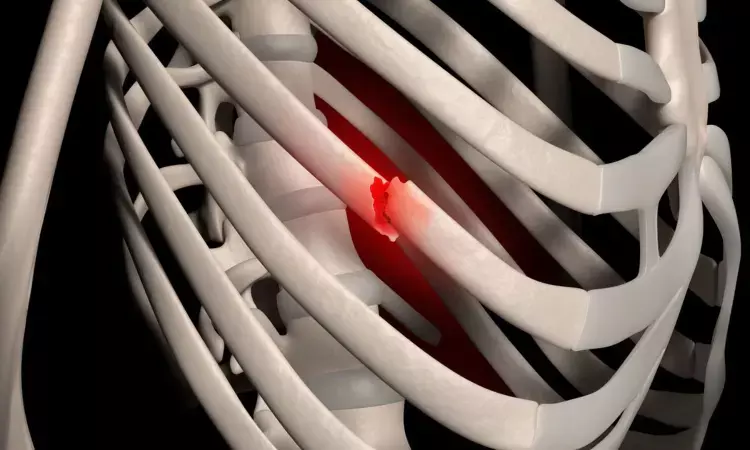- Home
- Medical news & Guidelines
- Anesthesiology
- Cardiology and CTVS
- Critical Care
- Dentistry
- Dermatology
- Diabetes and Endocrinology
- ENT
- Gastroenterology
- Medicine
- Nephrology
- Neurology
- Obstretics-Gynaecology
- Oncology
- Ophthalmology
- Orthopaedics
- Pediatrics-Neonatology
- Psychiatry
- Pulmonology
- Radiology
- Surgery
- Urology
- Laboratory Medicine
- Diet
- Nursing
- Paramedical
- Physiotherapy
- Health news
- Fact Check
- Bone Health Fact Check
- Brain Health Fact Check
- Cancer Related Fact Check
- Child Care Fact Check
- Dental and oral health fact check
- Diabetes and metabolic health fact check
- Diet and Nutrition Fact Check
- Eye and ENT Care Fact Check
- Fitness fact check
- Gut health fact check
- Heart health fact check
- Kidney health fact check
- Medical education fact check
- Men's health fact check
- Respiratory fact check
- Skin and hair care fact check
- Vaccine and Immunization fact check
- Women's health fact check
- AYUSH
- State News
- Andaman and Nicobar Islands
- Andhra Pradesh
- Arunachal Pradesh
- Assam
- Bihar
- Chandigarh
- Chattisgarh
- Dadra and Nagar Haveli
- Daman and Diu
- Delhi
- Goa
- Gujarat
- Haryana
- Himachal Pradesh
- Jammu & Kashmir
- Jharkhand
- Karnataka
- Kerala
- Ladakh
- Lakshadweep
- Madhya Pradesh
- Maharashtra
- Manipur
- Meghalaya
- Mizoram
- Nagaland
- Odisha
- Puducherry
- Punjab
- Rajasthan
- Sikkim
- Tamil Nadu
- Telangana
- Tripura
- Uttar Pradesh
- Uttrakhand
- West Bengal
- Medical Education
- Industry
Can anterior plane blocks be considered as routine analgesic adjunct in patients with rib fractures? Study sheds light

Australia: Rib fractures are a common consequence of traumatic injuries, often causing significant pain and discomfort for patients. Effective pain management in the early stages is crucial for improving outcomes and reducing complications. In a landmark study known as the SABRE randomized clinical trial (RCT), researchers have evaluated the efficacy of serratus anterior plane blocks (SAPBs) as a novel approach for early rib fracture pain management.
In the RCT of 210 patients with rib fractures, SAPB addition to standard protocolized rib fracture care bundles significantly raised the proportion of patients who met the composite pain score reduction at 4 hours. The findings were published online in JAMA Surgery on May 1, 2024.
Rib fractures secondary to blunt thoracic trauma typically result in severe pain that is notoriously difficult to manage. SAPB is a regional anesthesia technique that provides analgesia to most hemithorax; however, evidence of SAPB's analgesic benefits in rib fractures is limited. Christopher Partyka, Emergency Department, Royal North Shore Hospital, St Leonards, New South Wales, Australia, and colleagues aimed to determine whether SAPB addition to protocolized care bundles increases the likelihood of early favorable analgesic outcomes and reduces opioid requirements in rib fracture patients.
For this purpose, the researchers conducted a multicenter, open-label, pragmatic RCT at eight emergency departments across metropolitan and regional New South Wales, Australia, between 2021 and 2022. The study included patients aged 16 years or older with clinically suspected or radiologically proven rib fractures. Participants were excluded if they were intubated, had a major concomitant nonthoracic injury, or were transferred for urgent surgical intervention.
Patients were randomly assigned in a 1:1 ratio to receive a SAPB in addition to usual rib fracture management or standard care alone.
The primary outcome was a composite pain score measured 4 hours following enrollment. Patients met the primary outcome if they had a pain score reduction of 2 or more points and an absolute pain score of less than 4 out of 10.
In total, 588 patients were screened, of whom 210 patients (median age, 71 years; 62% male) were enrolled, with 105 patients randomized to receive an SAPB plus standard care and 105 patients randomized to standard care alone.
Based on the study, the researchers reported the following findings:
- In the complete-case intention-to-treat primary outcome analysis, the composite pain score outcome was reached in 41% of the SAPB group and 19.6% of patients in the control group (relative risk [RR], 0.73).
- There was a clinically significant reduction in overall opioid consumption in the SAPB group compared with the control group (e.g., a median total opioid requirement at 24 hours: 45 versus 91-milligram morphine equivalents).
- Rates of pneumonia (10% versus 11% of patients), length of stay (eg, median hospital stay, 4.2 versus five days), and 30-day mortality (1% versus 4% of patients) were similar between the SAPB and control groups.
The RCT found that the SAPB addition to standard rib fracture care significantly increased the proportion of patients who experienced a meaningful pain score reduction while also reducing in-hospital opioid requirements.
As healthcare providers strive to optimize pain management strategies and reduce reliance on opioids, the findings of the SABRE trial hold promise for improving outcomes and enhancing patient-centered care in the management of rib fractures. With further research and clinical implementation, SAPBs have the potential to become a standard of care for early rib fracture pain management, benefiting countless patients worldwide.
Reference:
Partyka C, Asha S, Berry M, et al. Serratus Anterior Plane Blocks for Early Rib Fracture Pain Management: The SABRE Randomized Clinical Trial. JAMA Surg. Published online May 01, 2024. doi:10.1001/jamasurg.2024.0969
Dr Kamal Kant Kohli-MBBS, DTCD- a chest specialist with more than 30 years of practice and a flair for writing clinical articles, Dr Kamal Kant Kohli joined Medical Dialogues as a Chief Editor of Medical News. Besides writing articles, as an editor, he proofreads and verifies all the medical content published on Medical Dialogues including those coming from journals, studies,medical conferences,guidelines etc. Email: drkohli@medicaldialogues.in. Contact no. 011-43720751


